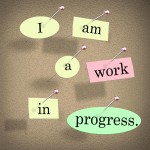Have you ever had this experience? You are facing a problem so you set a goal and chant very hard for it. At some point you achieve your goal and then you say, “Whew, well now that’s done I can relax. I don’t have to chant so hard now.” And you slack off, either stop chanting entirely, or cutting down to minimal levels. Then at some later time you find yourself asking this question, “Why isn’t this practice giving me the benefits it used to?”
When we chant like this, we have a very inconsistent practice. I call it bad weather chanting. This is when we chant mostly when we are in trouble. We’re chanting all out, or very little, an all or nothing practice.
Life is a struggle with ourselves a battle between progression and regression, between happiness and unhappiness. But it is through consist ongoing practice, month after month and year after year, that we build up the invisible storehouse of benefits and find the marvelous support that comes with regular practice.
It isn’t called practice for nothing. To establish a good practice, which is the particular challenge of the first year, means developing the habits of follow through, perseverance, the ability to motivate yourself and the ability to be consistent from beginning to end, chanting every day.
If you are short on willingness to be consistent, you may find that that inconsistency or lack of motivation to follow through exists in other areas of your life as well. This means that developing the will to become consistent is the first step of your human revolution. So how do you develop the will?
An Experience:
I wanted to write both books and a blog about this Buddhism. I have seen that some members are struggling with the practice and that new people can find it difficult to establish a consistent practice. Having worked professionally with the growth and development of people as a counselor, I thought I might have a way of looking a steps of growth that could be helpful.
Becoming consistent with my writing was a major challenge. I resisted doing it. I stared at a blank computer screen. I would do anything else before sitting down to write. I chanted about it. I resisted writing with all my being until a saying from The War of Art, by Steven Pressfield fell into my lap.
He said that any time we embark on a program of self-improvement or find our calling we will encounter Resistance. He says that Resistance:
- Prevents us from growing and doing our work. I think in Buddhism we would call it an aspect of fundamental darkness.
- Points to what we most need to do, that calling or action we must follow before all others.
- The more important that call or action is to our soul’s evolution, the more Resistance we will feel.
When I read that it was like a huge aha. My book must be critical to my evolution seeing the Resistance I was having to writing it.
I had to harness the power of the Gohonzon in this battle. I started chanting about topics for the book and ideas began to flow to me. When I sat down to write, I had something to write about. No more blank screen I also set up a consistent time to write, at a certain time of day. I set up my writing so I hadn’t quite completed something when I stopped for the day. Then I had a place to begin the next day. And I took my writing to a critique group so I would have to produce something on a regular basis and be accountable.
At some point sitting down to write became a new habit and I no longer struggled with Resistance.
Steps to Developing a Consistent Practice
I think Resistance lurks behind an inconsistent chanting practice. After all, chanting is the way to Enlightenment and the biggest self-improvement program of all, human revolution. Here are some ideas.
- Recognize this Resistance is a major battle with fundamental darkness.

- Chant to be a person of strong will.
- Chant for ways to get around your Resistance.
- Envision your end goal, having a consistent successful practice.
- Set a regular time to practice, like right after breakfast and when you come home from work.
- Maybe get a chanting buddy and touch base on a daily basis,. Become accountable.
- Renew your intent anytime you find your determination growing less with time.
- If you fall off, resolve to begin again from this day forward.Keep on keeping on. It will get easier.
To You, Reader
Please share your experience if you have successfully overcome Resistance to establishing a consistent practice. Tell us how you did it. This could be very helpful to someone who is struggling.
How true this is – a robust daily chanting ritual in goods times AND hard times balances all, feels good and puts a fire in your heart.
Never miss gongyo is my mantra. I do it first in the morning and last before getting into bed. Missing gongyo invites mistakes, accidents, bad behavior, anger and regrets.
2) Read something about Buddhism every day, especially Pres. Ikeda’s writings. A couple of paragraphs. Everyday. First thing out of bed. Do gongyo First. Miss it and you’ll see what happens.
Thanks for sharing this.
Margaret
Margaret, thank you so much for this encouragement and for your writings. You are a true inspiration. Nam Myoho Renge Kyo!
Thanks Chris.
Margaret